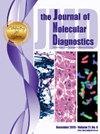OncoScan微阵列对HRD基因组不稳定性的可靠评估。
IF 3.4
3区 医学
Q1 PATHOLOGY
引用次数: 0
摘要
基因组不稳定疤痕是检测卵巢癌患者同源重组缺陷状态和预测PARP抑制剂治疗反应的标志物。目前,只有少数可靠且经过验证的检测方法可用,Myriad myChoice CDx是最常用的用于基因组不稳定性疤痕评分测定的商业检测方法;考虑到需要一种更直接、更容易获得和更可靠的方法来检测基因组不稳定性。在这项工作中,我们描述了使用微阵列OncoScan CNV检测和开源软件包来量化基因组不稳定性评分的可行性,以及开发一个开放获取的基因组不稳定性评分计算在线平台。我们实验室开发的测试基于来自Oncoscan CNV测定的基因组不稳定性评分,准确地分类同源重组精通和重组缺陷样品。与外部分析的基因组不稳定性疤痕评分相比,内部评估的基因组不稳定性评分显示出92%的总体一致性和更高的样本成功率。HRD检测的可用性使有资格接受PARP治疗的患者数量增加了一倍。该分析可以方便地在单个样品上进行,并且开放访问的在线平台促进了HRD的测定,而无需专门的生物信息学支持。本文章由计算机程序翻译,如有差异,请以英文原文为准。
Robust Assessment of Homologous Recombination Deficiency Genomic Instability by OncoScan Microarrays
Genomic instability scars are markers for detecting homologous recombination deficiency (HRD) status in patients with ovarian cancer and predicting the response to poly (ADP-ribose) polymerase inhibitor treatment. Currently, only a few reliable and validated assays are available, with the Myriad myChoice CDx being the most commonly used commercial assay for genomic instability scar score determination. Given the need for a more straightforward, accessible, and reliable method for detecting genomic instability scars methods, in this work, we describe the feasibility of using the microarray OncoScan copy number variant assay and open-source software packages to quantify genomic instability scores, and the development of an open-access online platform for genomic instability score calculation. The laboratory-developed test accurately classified homologous recombination–proficient and recombination–deficient samples based on genomic instability scores derived from the OncoScan copy number variant assay. Internally evaluated genomic instability scores demonstrated a 92% overall agreement and a higher sample success rate compared with externally analyzed genomic instability scar scores. The availability of HRD determination has doubled the number of patients eligible for poly (ADP-ribose) polymerase therapy. The assay can be conveniently performed on individual samples, and the open-access online platform facilitates HRD determination without the need for specialized bioinformatics support.
求助全文
通过发布文献求助,成功后即可免费获取论文全文。
去求助
来源期刊
CiteScore
8.10
自引率
2.40%
发文量
143
审稿时长
43 days
期刊介绍:
The Journal of Molecular Diagnostics, the official publication of the Association for Molecular Pathology (AMP), co-owned by the American Society for Investigative Pathology (ASIP), seeks to publish high quality original papers on scientific advances in the translation and validation of molecular discoveries in medicine into the clinical diagnostic setting, and the description and application of technological advances in the field of molecular diagnostic medicine. The editors welcome for review articles that contain: novel discoveries or clinicopathologic correlations including studies in oncology, infectious diseases, inherited diseases, predisposition to disease, clinical informatics, or the description of polymorphisms linked to disease states or normal variations; the application of diagnostic methodologies in clinical trials; or the development of new or improved molecular methods which may be applied to diagnosis or monitoring of disease or disease predisposition.

 求助内容:
求助内容: 应助结果提醒方式:
应助结果提醒方式:


